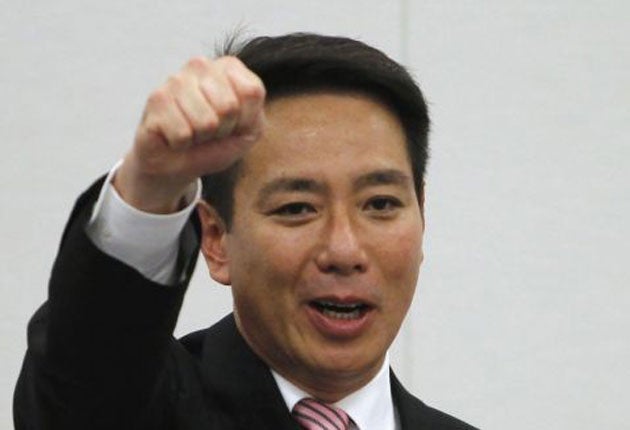Japan's would-be prime ministers jockey for position as Kan resigns

Your support helps us to tell the story
From reproductive rights to climate change to Big Tech, The Independent is on the ground when the story is developing. Whether it's investigating the financials of Elon Musk's pro-Trump PAC or producing our latest documentary, 'The A Word', which shines a light on the American women fighting for reproductive rights, we know how important it is to parse out the facts from the messaging.
At such a critical moment in US history, we need reporters on the ground. Your donation allows us to keep sending journalists to speak to both sides of the story.
The Independent is trusted by Americans across the entire political spectrum. And unlike many other quality news outlets, we choose not to lock Americans out of our reporting and analysis with paywalls. We believe quality journalism should be available to everyone, paid for by those who can afford it.
Your support makes all the difference.It is fitting perhaps that the resignation of Japan's prime minister was greeted by Tokyo's worst downpour of the year. Like a steamy tropical storm, the pressure in Japan's capital has been building all summer.
Its release with Naoto Kan's decision to finally quit frees the disaster-battered nation for yet another round of political jockeying, and its sixth leader in five years.
Mr Kan, 64, spent the summer battling a political lynch mob unhappy with his handling of Japan's worst catastrophe since the Second World War, and his abrupt turn against nuclear power. In a nationally televised speech last night, Mr Kan said he did the best he could. "Under the severe circumstances, I feel I've done everything that I had to do."
The race to succeed him starts today, with telegenic ex-foreign minister Seiji Maehara the clear front-runner of a rumoured six candidates. At 49, Mr Maehara would be Japan's youngest post-war prime minister, but his bid is complicated by two factors straight from the bottom of Japan's murky political barrel: an old funding scandal and his battle with a rival faction within his own left-leaning Democratic Party (DPJ). Veteran lawmaker Ichiro Ozawa, who leads the DPJ's biggest faction, yesterday backed trade minister Banri Kaieda, 62, as party president.
Some fear the DPJ may not survive another round of infighting. Whoever takes over as Japan's leader next week faces the mammoth task of uniting the party, clearing up after the 11 March disaster and earthquake, rebuilding the devastated north-east and housing thousands of families left homeless.
Shutting down the leaking Fukushima nuclear power plant alone will drain much of the government's energies, as will the political battle to restart the remaining nuclear reactors, 75 per cent of which are offline. All this must be done as the government struggles with a gridlocked parliament and the worst public debt in the developed world.
Mr Kan was accused of fumbling his government's response. He stunned his party by making a televised plea in July for a nuclear-free Japan. Polls found the plea was supported by more than 70 per cent of the electorate. But the conservative press, the powerful business lobby and many politicians in his own party turned against him. Some analysts say Mr Kan is a scapegoat for the country's failures. "The kind of criticisms and abuses he suffered in the period after the triple disasters are largely unjustified, and in fact, more telling of the collusive nature of the conservative establishment in Japan than anything the man was blamed for," said Koichi Nakano, a political scientist at Tokyo's Sophia University. Nakano says the conservative Liberal Democrats, who fell from power in 2009, "sought to put all the blame on him and avoid any responsibility for their previous decades in power".
Jeff Kingston, director of Asian studies at Temple University Japan, said Mr Kan will be remembered as the "least bad Japanese leader" since the mid-1990s. "Compared to his eminently forgettable predecessors over the past five years this is a worthy legacy. I doubt that any other politician in Japan could have done better under the circumstances."
Join our commenting forum
Join thought-provoking conversations, follow other Independent readers and see their replies
Comments